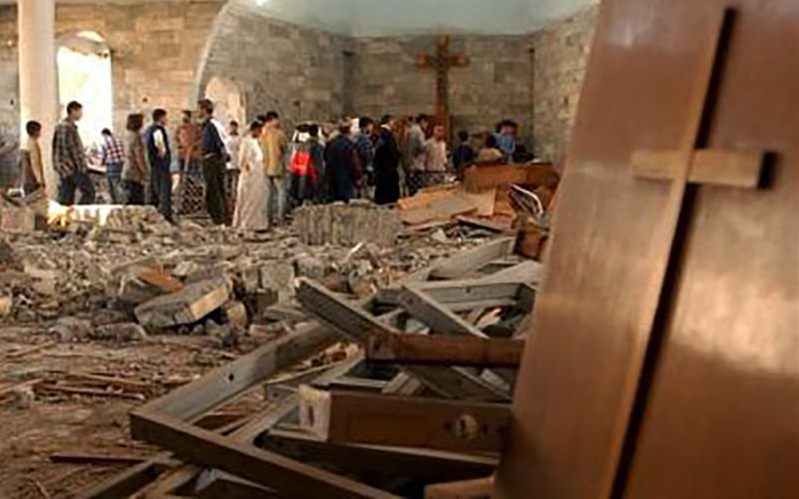
The plight of Christians in the Middle East has especially been brutal in Iraq and Syria. Now a college professor has tried to find a way to avoid a "clash of civilizations" in the region.
In an essay published in the Wall Street Journal, Walter Russell Mead, a professor of foreign affairs and humanities at Bard College, argued that although Christian communities in Iraq and Syria have survived over 2,000 years of tumult and war, they are now at risk of total destruction. He first looked at the history surrounding the "violent oppression" of Christians in both countries.
"The Ottoman Empire's well-known genocidal violence against the Armenians during World War I was accompanied by similarly brutal and widespread mass murders of Assyrian Christians," Mead wrote. "In the 1930s, in the ethnic and nationalist turmoil following the fall of the Ottomans, tens of thousands of Iraqi Christians were murdered in riots and massacres. Where will it end?"
Mead contended that the "religious cleansing" of Christians would have dire consequences around the world. He cited the example of Constantinople (now Istanbul) in Turkey, where in 1900 the majority of its residents were Christian; today, fewer than 150,000 residents out of the city's 14.4 million people identified with faiths outside of Islam.
"The years ahead may bring a similar fate to other Christian communities, consumed by the fires of fanaticism," Mead wrote. "But the risk is not just regional: The loss of a meaningful Christian presence in the Middle East could further polarize relations between Christians and Muslims around the world-and bring us a step closer to the kind of 'clash of civilizations' that no sensible person wishes to see."
Mead looked at the history of the world order before World War I broke out. He noted that the region functioned more like "a salad bowl" instead of "a melting pot."
"Wars of independence became wars of peoples and wars of religion," Mead wrote. "Turks massacred Christians, whom they suspected of sympathizing with the rebels, and Christians massacred and drove out Turkish civilians and Muslims on the side of the empire. And of course, from time to time, everyone took a turn persecuting the Jews."
Mead added that from a historical standpoint, when it came to "wars of identity" in the Middle East, "Muslims have more often been the perpetrators and Christians the victims." He elaborated on the various strategies Christians used to survive in the region.
"Over the centuries, Middle Eastern Christians have developed many survival strategies. One is to stay invisible," Mead wrote. "Christians have often survived best in remote areas, and those in more densely populated areas often do their best to avoid antagonizing their neighbors."
According to Mead, the other survival strategy Christians used was asking for help from foreign protectors.
"In the 19th century, the Christian powers in Europe and the U.S. took an increasing interest in the situation of Christian and other minorities in the Ottoman lands," Mead wrote. "The Orthodox looked to Russia; Catholics in the region looked to France; Britain and the U.S. asserted a right to protect Ottoman Jews as early as the 1840s; and Armenians often looked to the U.S., among others, for help."
However, Mead noted that Christians in the Middle East found out at great cost that "the international community," including Western powers, was considered "weak reeds" at best.
"They have been (and still are) slow to intervene, and their interventions have usually been halfhearted, short-term and subject to the vagaries of great-power rivalries," Mead wrote.
The other survival strategies Mead outlined included developing a "secular Arab identity" or clinging to "strong rulers." However, both strategies have made Christians even more marginalized in the region.
"For the despots, Christian allies served many of the purposes that Jews once did for kings in the Middle Ages," Mead wrote. "They were seen as loyal because they had no other place to turn-and as useful both for their services and because you could blame them when things went wrong (and, if necessary, throw them to the wolves)."
Given that all the traditional survival strategies for Christians in the Middle East have failed, Mead reported that they had only three options: creating a defensive enclave, flee the region, or just wait to die.
"In the modern Middle East, the minorities that have survived, and in some cases thrived, have acquired a military capacity," Mead wrote. "The Jews, the Kurds, the Armenians, the Maronites and the Druse have not all created states, but they have all built redoubts."
However, given the slow reaction of the West on the plight of Christians and other minority groups in the Middle East, outside of fleeing the region altogether, the "most probable course" appeared to be grim.
"We can wring our hands and weep piously as the ancient Christian communities in Syria and Iraq are murdered, raped and starved into oblivion, one by one," Mead wrote.







